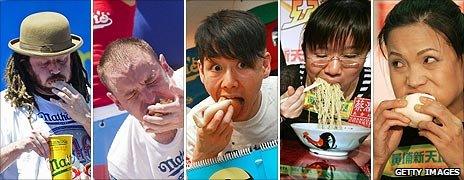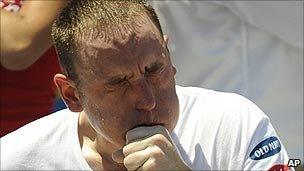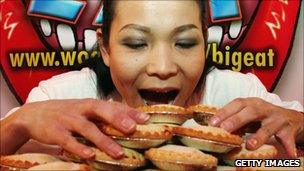Is competitive eating the world's weirdest sport?
- Published

The sport is popular in the US and growing in the Far East
The arrest of Takeru Kobayashi, who has avoided punishment after appearing in court to face charges that he disrupted a competitive eating contest, has intensified interest in one of the world's odder sporting phenomena.
Most of those who attend a competitive eating contest for the first time are surprised by one thing.
The contestants are not fat.
At 5ft 8in (173cm) and 132lb (60kg), Takeru Kobayashi is on the slender side, but that does not stop him eating inordinate amounts of hot dogs.
At Nathan's Hot Dog Eating Contest on 4 July last year, he ate 64 hot dogs in 10 minutes. But that was only enough to come second.
Joey "Jaws" Chestnut chewed his way through 68.
"My mentality is to be healthy," Chestnut explains. "You can't be unhealthy and push yourself."
Like more conventional athletes, he has a training regime. Before a big competition he will do practice eats. And in the run-up to the big events, he will fast for three days, consuming only milk, water and liquid amino acid.
He wants to make sure he is "absolutely empty for the actual contest".
"I make sure I've got a reason to eat that much," he confides.
On the day, there are certain tricks. Dunking hot dog buns in water makes them easier to eat, and drinking hot water throughout makes food settle better in his stomach. Certain foods are harder to gorge on than others - he recently had difficulties at events featuring crab cakes, and chocolate bars.
This year, Chestnut could not face his great rival Kobayashi at the Nathan's event on Coney Island.
The Japanese eater was in dispute with Major League Eating, which controls many of the eating events, staging orgies of pizza, oyster and burger consumption.
They will only sign up contestants who agree to be exclusive, and Kobayashi does not want to lose the chance to compete in rival events.
But he did not take exclusion well. He turned up anyway on 4 July this year and allegedly tried to invade the stage. Hence his appearance in court.

Joey 'Jaws' Chestnut is regarded as the best in the world
Kobayashi - who was told by a judge his case would be removed from the record if he behaves himself for six months - seems unrepentant.
"I don't feel I did anything wrong. I am happy I was able to make my fans happy."
George Shea, chairman of Major League Eating, has been running Nathan's and other contests since 1988.
"It's now a cultural tradition. People find it very funny and kitschy," he explains.
There have been 86 events organised by his firm already this year and he estimates that Chestnut's earnings will run to $200,000 (£130,000) a year.
Chestnut has a day job as a construction manager but Kobayashi has never worked.
Woman eaters
The money comes from fast food, casino and even heartburn medicine brands that want to get oodles of publicity.
Over summer there can be several events each weekend, not just in the US, but as far afield as Australia and Singapore. The UK - yet to embrace competitive eating - is a target market for Mr Shea.
There have been eating contests since time immemorial, but Mr Shea and his promoter colleagues claim some of the credit for amplifying the concept into a sport.

Sonya Thomas is small but a powerful eater
There are top woman eaters as well, with Sonya "Black Widow" Thomas probably the best known.
Chestnut and Kobayashi say remarkably similar things about the appeal of competitive eating.
"Everybody knows what it feels like to be full. Everybody wonders what it would be like to eat that much of a certain food," says the American.
The Japanese eater notes: "It is something that everyone does. To eat, it is understandable for ordinary people."
There will of course be people who find competitive eating distasteful, or believe it sends out the wrong message during a time of rising obesity.
Mr Shea dismisses this.
"I don't think anyone thinks this is the way someone should eat on a day-to-day basis," he says.
'Choking risk'
"If we thumbed our nose at obesity and any other food-related issue, that would be a problem and that would be offensive. We do a lot of work with hunger charities."
And some might wonder whether there are health risks to stuffing oneself with thousands of calories in just a few minutes.
"At the very least you are risking choking to death or having some kind of stomach or oesophageal tear," says Marjorie Nolan, a registered dietician and spokeswoman for the American Dietetic Association.
"If you are doing this on a regular basis, it could set you up for major digestive issues down the line."
Mr Shea emphasises there is always professional medical help on standby at the big events, and says that unhealthy training is frowned upon.
"The idea of someone training at home with a 40lb (18kg) bowl of pasta is not something we encourage."
Chestnut says the worst he has suffered is a bit of heartburn, and that his doctor recently gave him a clean bill of health.
Not that the eaters' families are always convinced.
"My family is always worried about my health," says Kobayashi. "My parents always thought I was a little bit strange."
Chestnut says his family is "happy", five years into his curious sporting career. "They think it is weird still. I think it is weird still."